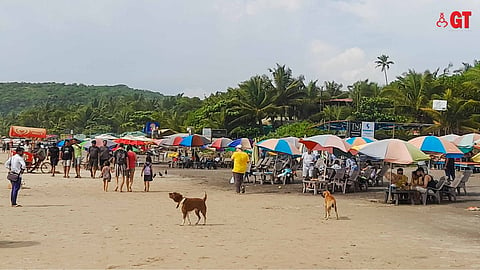

The focus in Arambol is shifting from the sweet water lake to the varied activities hosted through the year, on and off the beach. Apart from walks, there are mud bath centres, mediation areas, yoga workshops and, of course, places where parties are organised.
Arambol beach is a thriving hive of tourist activity and is witnessing the growth of hotels, rooms, homestays and rent back apartments, thus drawing in the crowds.
The tourism cap that adorns the north has not changed, but now finds a nice stick to perch itself up on this beach that once attracted hippies mainly for its sweet water lake.
The lake, as it existed in the past, is today a distant reality, primarily because the government decided to leave it unattended, and illegal constructions on the hill, with no proper planning, have left it looking unhealthy.
Arambol beach is, today, a home to Russians, people of African origin and tourists from North India. Unlike in other tourist centres, most businesses here are run by outsiders, with locals being the rent collectors.
“We never thought tourism would reach such a level in our village. Since the arrival of Indians during, and after, the Pandemic, the footfalls have increased dramatically and many have opted to start new businesses,” says Alfred, who grew up being witness to the sweet water lake being the main draw of Arambol.
If a tourist needs a mud bath, Arambol is the place. There are places offering mediation courses, and with Hare Krishna and Osho devotees all over, spirituality has taken a different glow on the beach.
Arambol, therefore, for many domestic tourists, is a drive away to seclusion from the teeming crowds of Anjuna or Vagator.
“The locals here are very understanding. We have no problems,” gushes Yuri as he picks up vodka from a retail shop.
Although Arambol has a few top-end restaurants, the food and drinks available are palatable for a nice evening or a good party.
“They normally have their parties near sand dunes, and these stop the sound from disturbing the villagers,” says Ashish, whose father runs a business in the market.
The erratic rains have delayed the start of many shacks on the beach, and the few that function, mainly offer tourists a feast of chop suey or anything that fries along with noodles.
“We came to see the sweet water lake, and since there are no shacks around there, we have come to the beach to have a quick bite. We will then move on to see Tiracol,” says Sen from Bengal.
Apart from handicraft sellers and men and women offering massages, photographers seem to be making a quick buck on the beach, haranguing customers with the offer of a ‘professional’ picture.
“Business has started and the Russians who recently arrived by charter are my best guests as of now. They do not bargain much nor do they waste much time checking my stuff. They normally leave with what has attracted them,” admits Hussain, who sells handicrafts on the pathway to the beach.
If the morning sees a rush of domestic tourists coming for a lively time, evenings see tranquillity with the appearance of flower children, music floating in the air and beer bottles being popped open.
As night begins to grow, it becomes obvious that Arambol has been keeping pace with time – the locals being good hosts and the foreigners finding what they want on a holiday in Goa.